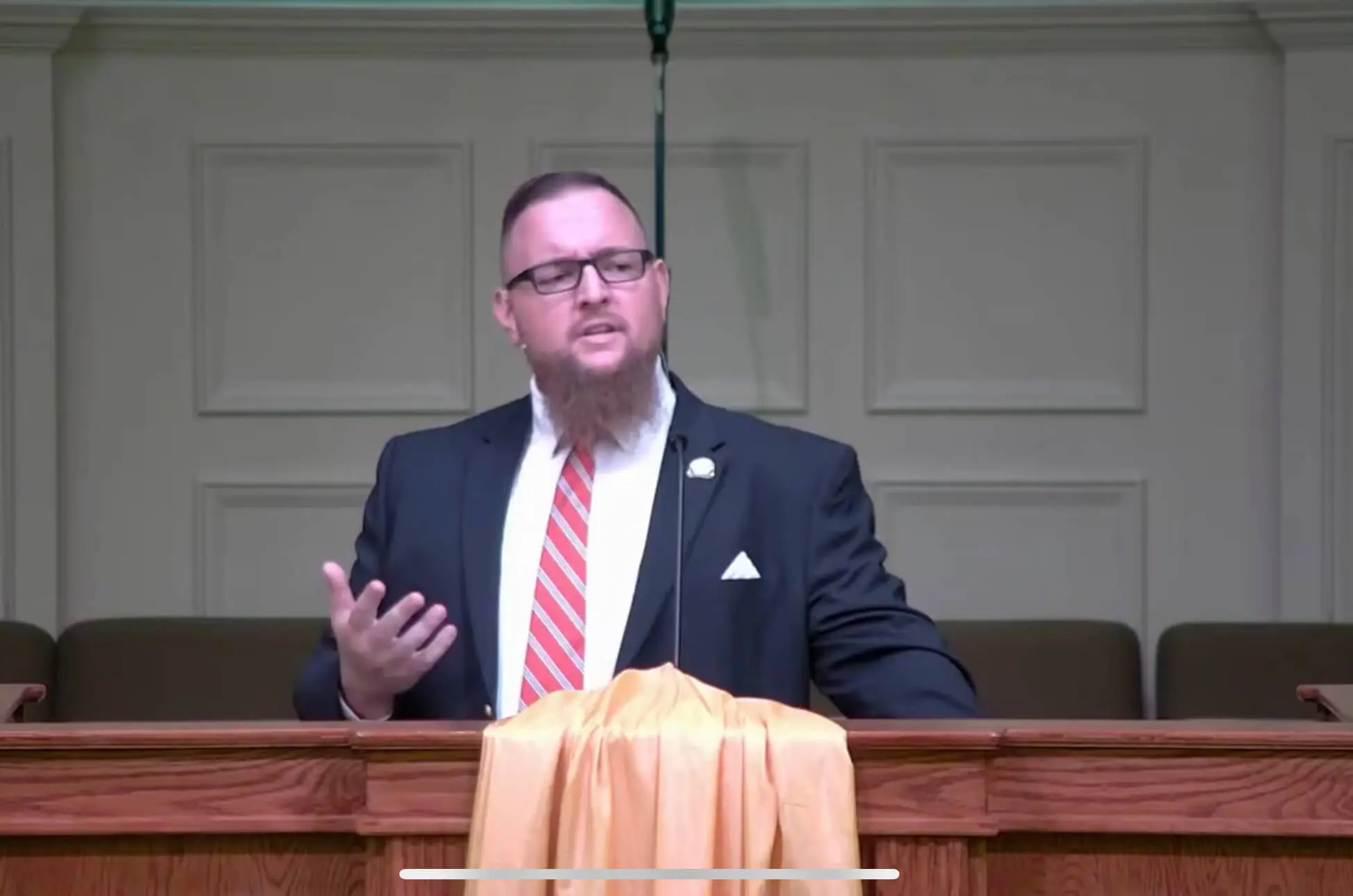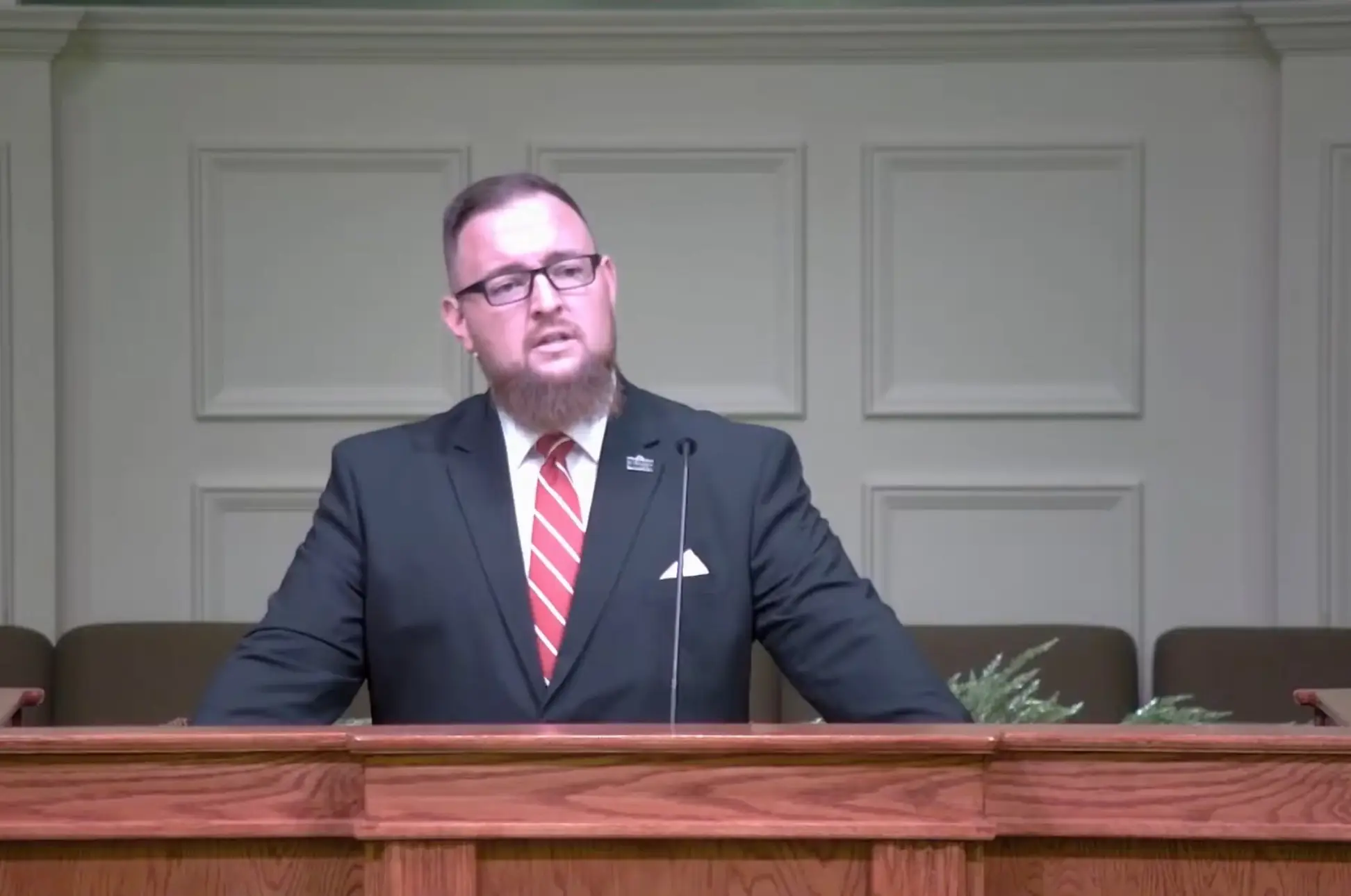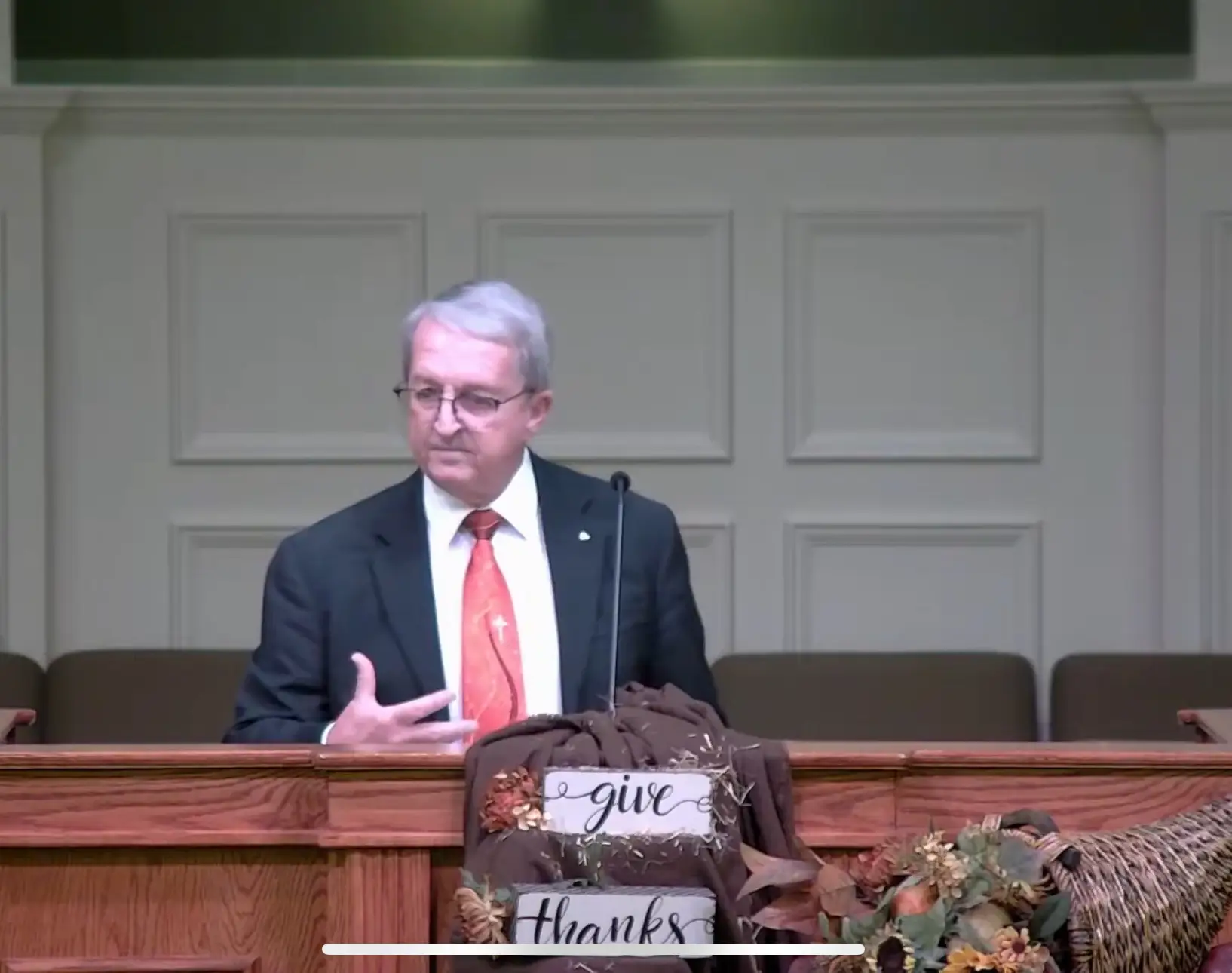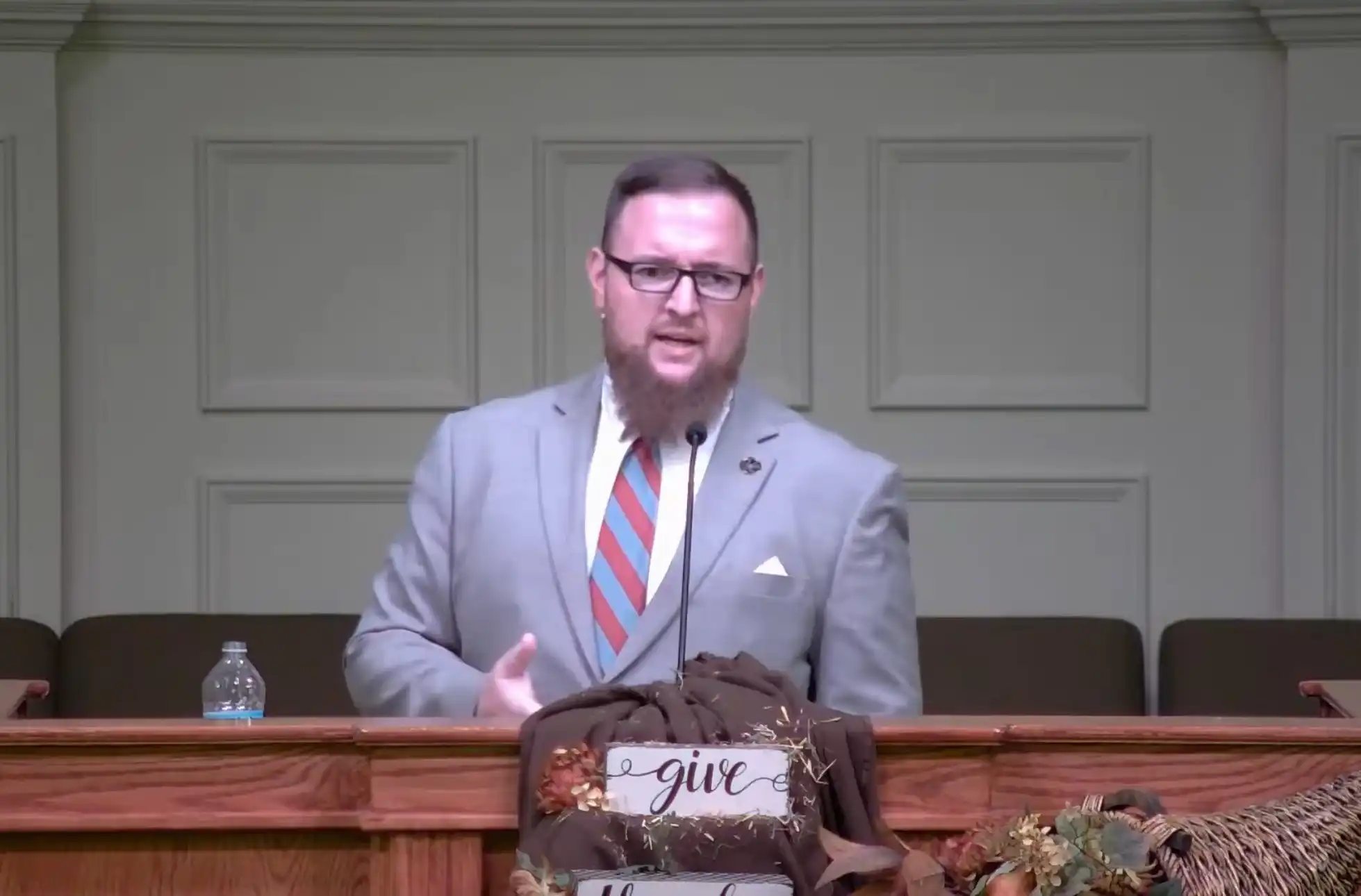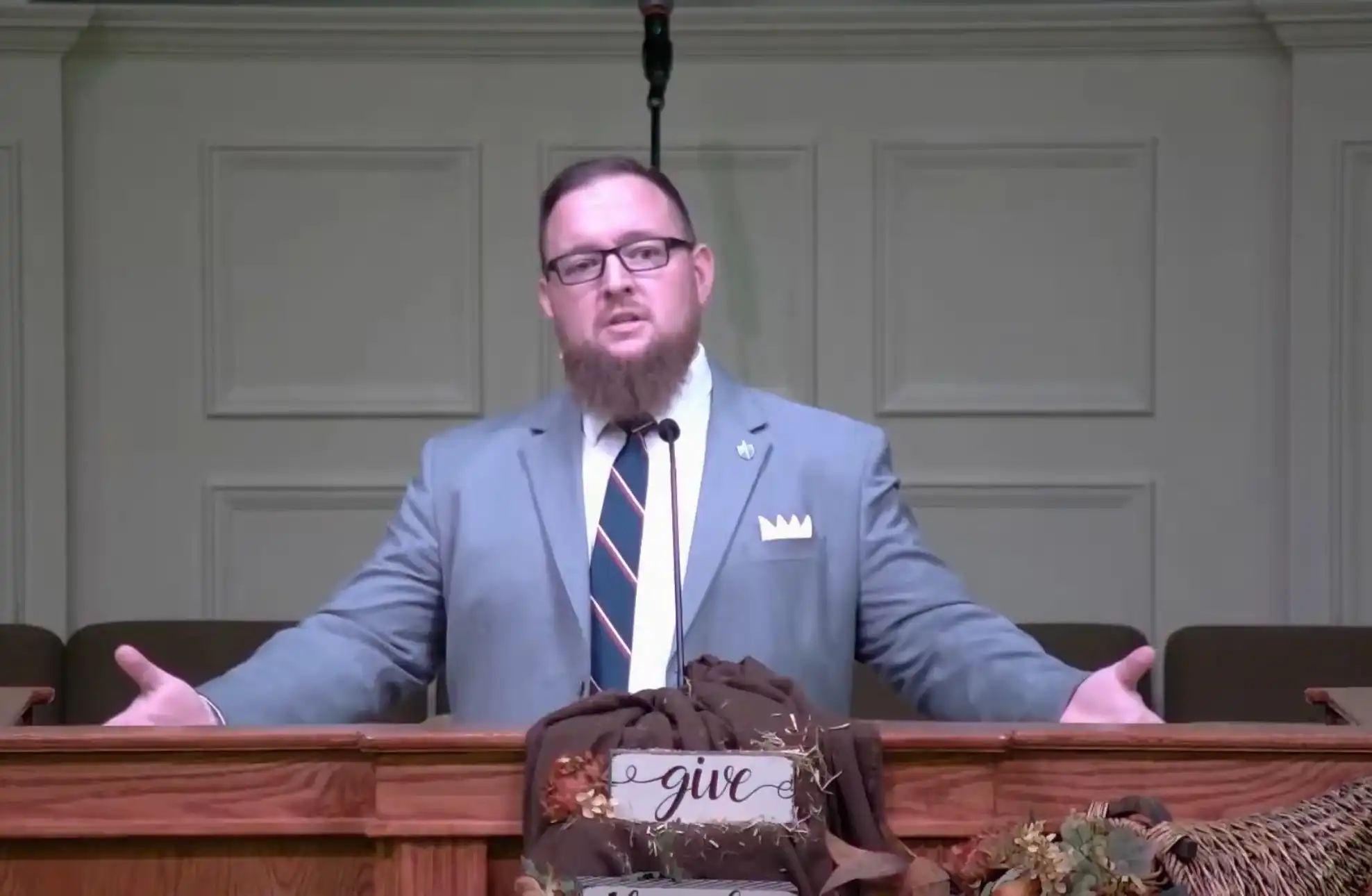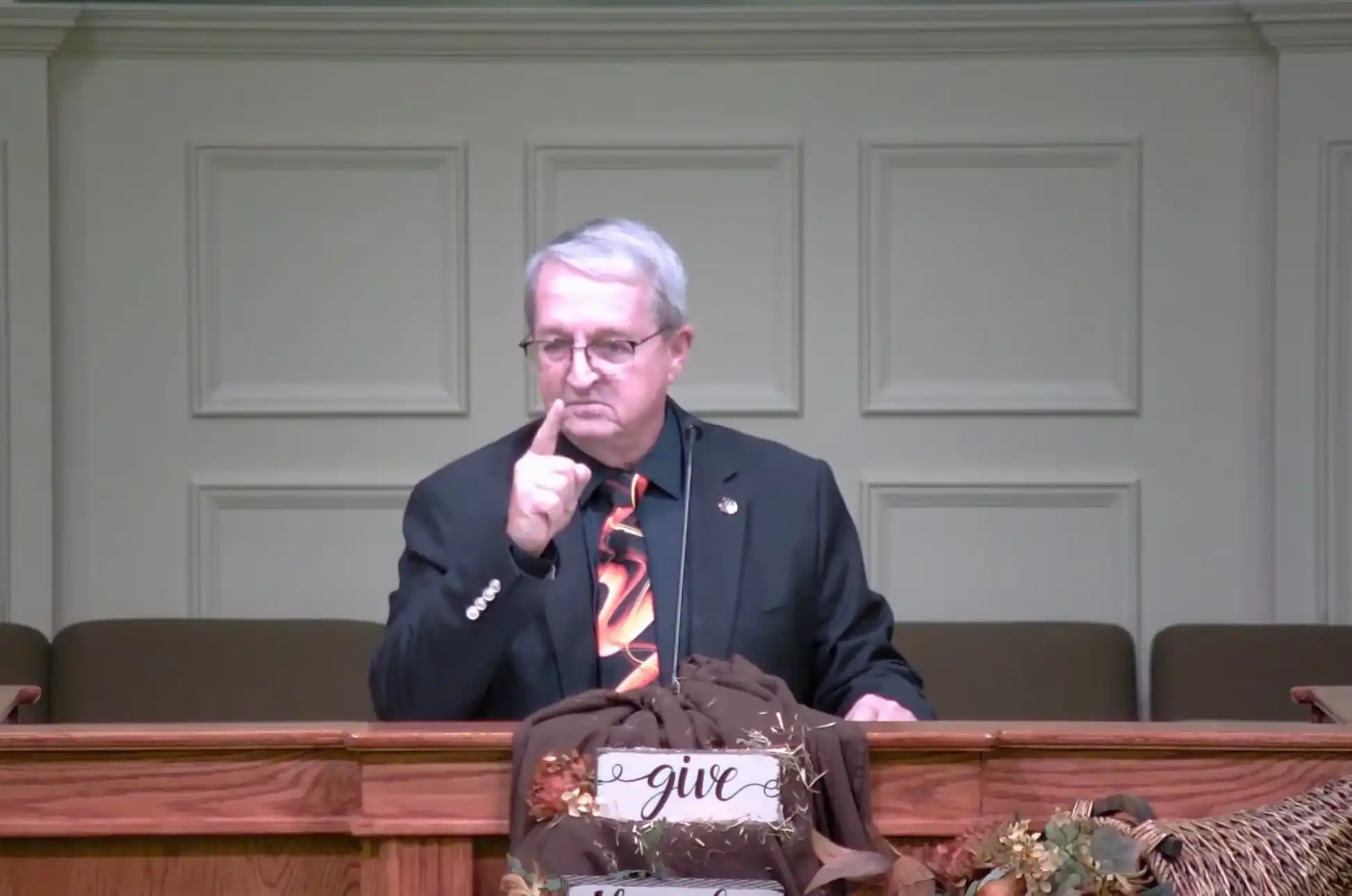Video
“The Expectation of the Son”
John 1:29-34
Pastor Ryan J. McKeen
09/07/2025
Audio
Transcript
Amen indeed. I heard that song at the last Shepherds Conference I was at out in California. And when you have 5,000 men singing that song together, it just gives you goosebumps. So I’ve really enjoyed that song. And then I heard it again a couple of weeks ago when I was watching the memorial service for John MacArthur. And as I heard that again, it occurred to me, this song would go perfect with this new series that we are beginning today.
You got a bulletin, there is an insert in your bulletin that explains or shows you what the series that we’re gonna be doing is, and it’s called The Son of God. So this morning, is the first of the 10 sermons listed there on that handout. And I want to begin this sermon by giving us not only an introduction to this sermon, but an introduction to the series, really explain what we’re going to be doing over the next 10 weeks.
We do have a good bit of introduction to start with this morning, so try to stay with me. But we will get into what John chapter one reveals to us about the son of God here this morning. We have been in the gospel of John since really the beginning of this year. We’ve been going verse by verse through the book and it’s really been great. It’s been a blessing to me and I pray each week that it is a blessing to you as we open up and see what the Apostle John had to tell us about his dear friend and Lord and Savior, Jesus Christ. But here today, we’re going to pause our verse-by-verse study and do something a little different, and for a few different reasons.
One of the reasons we are doing that is that this is part of my doctoral dissertation project. And I explained a little bit of that in the email that I sent to those of you on our email list. And that included a survey that’s part of what I’m doing with this. But last year, as a lot of you have been following my progress through my doctorate, and I’ve been able to share with you the different things we’ve been able to do, But last year, as I approached the end of my classwork and had my dissertation year looming ahead of me, and had to figure out what it is that I’m going to study and write my project on, and it is a preaching degree, so it has to be involved in the preaching ministry of this church, so they encourage you to go in a few different directions and try to help you. And one of the things they encourage you to do is to look at what you’re already going to be preaching. And how can you really accentuate what you’re already doing and serve your church body in that process.
So, as I thought about that, I looked ahead and I knew that we were gonna begin the Gospel of John at the beginning of the year. And so I really had to sit down and study the whole book and really see the main themes and purposes in it and really see what would be most helpful for us as we are, as we last week came to the fifth chapter in the gospel of John. And again, I’ve mentioned many times in the study of the book of John that John tells us very clearly what his purpose is, why it is that he wrote this book for us, which is helpful for what I am trying to do and trying to find the themes of John. And we find that in John chapter 20, verse 31. And that will be the passage for our final sermon of this series. But there in John 20, we see John tell us that these things have been written so that you may believe that Jesus is the Christ and the Son of God, and that by believing you will have life in his name.
So if we are going to understand John’s book, the Gospel of John, we need to understand John’s terms. What does he mean by the term Christ, or the term the Son of God? And so, as I’m looking at those things, I have to be even more specific. So I narrowed it down to focusing on the name, the Son of God, and that’s why this series is called The Son of God. And as I studied out the whole book of the Gospel of John and I started to look at the passages and really planned out the whole year of the passages I would preach each Sunday to see where we would be this fall, and I realized that we would be coming to chapter five. And also, as I mentioned last week, I found in this study of not only this book, but this name throughout the book, that in John chapter five is where Jesus first uses the name the Son of God for himself.
Now that seems significant, doesn’t it? So, as we come to that point in John’s gospel, another reason why I wanted to do this study is that we really need to understand this in order to understand what John is trying to tell us. So that’s exactly what we’re going to do in this series, is look at how John uses the name the Son of God and what it teaches us about Jesus Christ. Now, the name Son, just by itself is used all over the place. Jesus is called the Son a lot, but sometimes it’s referring to the Son of Man or even just as the Son itself. So what we will do is focus on the passages that use the full name, Son of God. And those are laid out for you there in that handout that you have. There are nine passages that use the name Son of God, and we will do 10 sermons because the John 5 passage needs to be split into two because there’s a lot there. And again, you can see the sermons, the titles of those sermons, the passages there, and that’s where we’re going to be going in the next 10 weeks. The first three passages, the first three sermons that we’ll do, they are passages we have covered already if you’ve been here for all of the John sermons.
So, these sermons, we will briefly review the context there, but we’re specifically gonna focus on that name. Son of God, and what it is that John is telling us by revealing to us that he is the Son of God. Again, this series also has some specific goals in mind. There are some things that I hope that this series accomplishes for all of us. And that’s found on the back of your insert there. There are four goals listed out there. The larger objective of this series is that you would grow to love Jesus Christ even more because of a deeper understanding of what it means that He is the Son of God. But in order to achieve that, there are specific goals regarding our understanding of this doctrine, of how it affects our evangelism, how it affects how we share Christ with others.
Also, we’re going to look at how this understanding of Christ affects our worship. When we worship, when we come together and we worship corporately and we sing and we read and we pray and you hear sermons and how understanding who Christ is affects all of those things. And then lastly, We will see how understanding who the Son of God is affects our discipleship, affects His authority over us in our lives, and how that affects our day-to-day decisions and actions, and how we ought to think about life because of who He is. So that is the goals that I pray that this series accomplishes for us, is to grow us in each of those areas. And as I mentioned, I sent out in that email a survey, and that is to really get a baseline to begin with. of all the different questions that relate to these four areas and I plan to do another survey at the end to see and track how we’ve grown through the understanding gained through this series. So again, we’ll follow that up later on. But that is really an introduction to the series. What we’re going to do here over the next 10 weeks and why we are doing it.
So, now that we have that foundation laid, what I wanna do now is really think about this name, the Son of God. And the Son of God, again, we don’t see till chapter five that Jesus uses it of himself. but we see other uses of it. So there was already an understanding of the Son of God. Jesus wasn’t telling everybody something new, that there is a Son of God. that He is the Son of God. They already had an understanding of that. And John teaches us this as we read through and understand and study this gospel. The title Son of God is really one of the most significant titles in all of Christianity, in all of our understanding of who Christ is. The Son of God is a significant one. One scholar, Martin Hengel, he says this, more than any other title in the New Testament, the title the Son of God connects Jesus with God. He goes on to say that it is meant to express the fact that in Jesus, God himself comes to men and that the risen Christ is fully bound up with God. That is what that name seeks to communicate, and that’s what we’ll see as we study all of these passages of John that use this name like this.
This term appears throughout Scripture, and it has a variety of meanings and implications, and we even see it in the Old Testament. name the son of God and even the theme of the son of God run through the Hebrew scriptures. So the Jews had an understanding of what it meant to be a son of God. And so as Jesus comes and is born of a woman and begins to live and minister, and they start hearing that name son of God again, they have an understanding of what that means. And as with a lot of the things we’ll cover in this series, there’s a lot more depth that I have gone into in my study and writing for this, and I can’t put all of that into a sermon. So hopefully you have the privilege of being able to read some of the study that I’ve been able to do on this, but I’ll have to summarize a lot of these things to bring them to you in sermon form. But again, the Old Testament uses the term, the Son of God, in a few different ways, and now it’s not always referring to Jesus or the second member of the Trinity.
The name Son of God or Sons of God is used all over the place and some of them are relevant to our study and some of them are not. For example, you have in Genesis, where the sons of God had children with the daughters of men, and that’s a whole other discussion that we’re not even going to touch. We’re not getting into that, because it’s not really relevant to the understanding of Jesus’ use of the name, the son of God. You also have in Job, where Satan and the other angels come before God, and they’re called the sons of God. And there’s other places where angels are referred to using that name, but again, that’s not super relevant to what we are studying. There are three figures, though, in the Old Testament that directly relate to who Jesus is and what he came to do.
There are several passages that speak of the pre-existence of the Son of God, that Jesus did not become a son, At his incarnation, he did become a man, but the Bible refers to him as a son before his incarnation as well. Or to say it another way, he did not become the son. He always has been the son. He is the eternal son of God. And we’ll look at this more when we get to the sermon on John chapter three, when we talk about what does it mean that he’s begotten? That he is the only begotten son of God. That’s a very important term, and it’s a very important doctrine. We need to understand that, so we’ll get a little deeper into these things when we get to that third sermon, but a couple passages that reveal the Son of God in the Old Testament, just to whet your appetite before we get to that sermon, but a few places where the Son is clearly seen. Proverbs 30, verse four. Proverbs 30 verse 4 is speaking of the things that God can do, the things that reveal who God is.
Proverbs 30 verse 4 says, who has ascended into heaven and descended? Who has gathered the wind in his fists? Who has wrapped up the waters in his garment? Who has established all the ends of the earth? What is his name? Jew, any Israelite would know the answer to those questions. That is God. It is Yahweh, the God of Israel. That is who these questions find their answer in. But there’s more questions. Because after it asks all these, and it says, what is his name? It says, what is his son’s name? What is his son’s name? Surely you know. So speaking of God and all the things He can do and the answer to these questions must be that it’s God and He has a Son. What is His Son’s name?
Another place where you see the Son of God speaking in Isaiah, a passage that reveals the Trinity is Isaiah 48. Isaiah 48, as we begin to see the suffering servant and the revelation Isaiah has of the one who would come to deliver his people. Isaiah 48 verses 15 and 16, I, even I have spoken. Indeed, I have called him. I have brought him and he will make his ways successful. Then he says, draw near to me, hear this. From the first, I have not spoken in secret. From the time it took place, I was there. So now, Lord Yahweh has sent me and his spirit. There you have the sender who is the father. The one being sent is the Son and He also sends His Spirit. There’s all three of the persons of the Trinity there. So this idea that there was a Son of God who was sent is not a foreign concept to the Israelite mind.
Again, we’ll talk about this aspect more in the future, but there’s a reason why when the Pharisees heard Jesus being referred to as the Son of God, as we’ll see in John chapter five, there’s a reason why they react the way they do. Because they know exactly what that means. That God has a son. and he is equal with God, and by using that name, Jesus is claiming to be equal with God and to be God himself. But specifically, this idea of the Son of God is a theme throughout the Old Testament, and we’re gonna look at three specific figures that show us what it means to be a son of God and how each one of them are fulfilled in Christ. And these three sons that point forward to the true Son of God are Adam, Israel, and David. Adam, Israel, and David. And we’ll briefly look at these three sons of God and what they were given to do and how Christ fulfills those roles. Generally in the Old Testament, Being a son of God meant one had a specific mission or task to complete. And that’s what we’ll see with these three.
First we see Adam, the very first man. And although the title is not given to him in the Old Testament, we see in Luke’s genealogy of Christ, as he works his way from Christ back to God. We see in Luke 3.38, as you get to the very beginning of The first family tree, you see the son of Enosh, the son of Seth, the son of Adam, the son of God. Adam is considered the son of God as the very first man, as one with no human parents. He is called the son of God in Luke 3.38, and God did give Adam a specific mission and task. He was to be the mediator, the ruler on earth, or you could say the king in God’s place over creation. And yet, as we know, he failed. He failed the task he was given. He did not rule over creation the way that he was supposed to. In fact, he sinned. He broke the one rule God gave him.
You see that in Genesis 3. And as a result, he and all of creation are cursed. And yet, Psalm 8 reveals to us that man still has a responsibility over creation. That man still has a responsibility to rule over the works of God’s hands. And this task and mission given by God to the Son of God, Adam, it is fully and finally fulfilled. in Jesus Christ, the true Son of God, the second Adam, under whose feet all things are put into subjection. So Adam is the first Son of God we see that points us forward to the true Son of God.
The second one we see is Israel. Israel is called a Son of God. You see in Exodus 4, as God is speaking to Moses, preparing him to go deliver the people from Egypt. He calls Israel my son. In Exodus 4, verse 22 and 23, he says, Israel is my son. And he tells Moses to go tell Pharaoh to let my son go, that he may serve me. You also see in Hosea chapter 11, a magnificent prophecy in scripture, one that looks in two directions. As the prophet Hosea says, out of Egypt I called my son. We know he on one hand is speaking of the Exodus where he called his son out of Egypt. Yet we see in the New Testament revealed that Hosea is also speaking about the true Son of God who he would call out of Egypt.
We see that in Matthew chapter 2. Israel was given a mission and a task to be an obedient son, and they failed. They failed to keep the covenant God gave them. They failed to love God with all of their heart, soul, mind, and strength. And so this son was cast into exile. But we see that Jesus comes and fulfills the role of the true obedient son, the son who fulfills all righteousness, as we see in Matthew 3. And he is the true seed of Abraham, as we see in Galatians 3. So Israel is another son of God who points forward to the true son of God who would come.
And the third one we will briefly look at is David. David is also called God’s son. In 2 Samuel 7, verse 14, God speaks of David and his descendants as a son to me. He’s speaking of the kingly line, and similarly, as we read to open the service in Psalm 2, Yahweh speaks of one who is his king, and he says, my son. We’ll look at Psalm 2 again in the future. It’s an important passage regarding the Son of God. But here in Psalm 2, David refers both to himself and his offspring, but also to the one who would come, the one who would shatter the nations with a rod of iron. He looks forward to Christ, the coming Son and King, who would ultimately fulfill this role. And David was given a mission and a task to rule over God’s people and to rule over the nations and the ends of the earth. And they were to lead the people in righteousness. But we see all of these sons of God fail in their mission and task.
But Jesus is the son of David. who sits on the throne of David and fulfills the role that God’s Son was supposed to fulfill. He is the Son. He is the King who rules in righteousness. Jesus will ultimately fulfill this role when he returns to establish his kingdom on the earth. So we see here, the Old Testament shows us three sons of God in Adam and Israel and David, and each of them is fulfilled in Christ. Jesus is the last Adam. He fulfills Adam’s mission and task of ruling over creation. Jesus fulfills Israel’s task of obeying the father. And he is the true king and the son whose throne is established forever. So that is the understanding that John and the rest of the disciples and those of his time would have had of what a Son of God is, what it means to be the Son of God.
So how does the New Testament use this name? How does the New Testament use the name, the Son of God? Well, quite obviously we’re going to see it refers primarily to Christ. Christ is the Son of God that was coming. Although, believers are also blessed with adoption as sons. We see that Jesus Christ and his believers are all considered sons of God, and because Christ is the Son of God, those who are in him are heirs with him. And this name, the son of God, is given to Jesus and used of him throughout the New Testament. We’ll see where it is in John, but you see this name given for different reasons. At his baptism and his transfiguration, the father speaks from heaven and says, this is my beloved son in whom I am well pleased. And at the transfiguration, he adds, listen to him. As the Father’s beloved Son, Jesus has the authority to be obeyed. Again, the Gospels record many people, including unbelievers, using the name the Son of God for Jesus.
At His trial, before the Sanhedrin, they ask Jesus, are you the Son of God then? He replies, you yourselves say that I am. You yourselves, even unbelievers, say who He is. During His crucifixion, the mockers are there and they say, if you are the Son of God, come down from the cross. And as He dies and yields up His spirit, the Gentile centurion, after witnessing this crucifixion, He admits that Jesus truly was the Son of God. Even the demons that Jesus cast out declare Him to be the Son of God. You see it on the tongue of His disciples. Peter confessed that Jesus is the Christ, the Son of the living God. And when He calms the storm, the disciples say to each other, truly He is God’s Son. And these are just a few of the passages where Jesus is confessed as who he truly is, as the Son of God the Father.
As we’ll see in a few weeks, Jesus is the only begotten Son. He is from the Father, and he is eternally from the Father. And the fact that Jesus is the Son of God highlights the sacrifice given for our atonement. Galatians 4, where we read earlier, tells us that God sent forth His Son. Jesus didn’t become God’s Son when He was born of the Virgin Mary. God sent forth His Son who was already existing with Him to be born of the Virgin Mary. The son who he was in perfect communion with, an eternal relationship of love. And he gave his son for us. Romans 8:32 says that God did not spare his own son, but delivered him over for us all. And when the apostle Paul was converted. He immediately began to preach about Jesus saying, he is the Son of God.
Paul knew who Jesus was. Paul confesses throughout his writing that he is the son of God. He tells us that our only hope, the believer’s only hope, as we see in 1 Thessalonians chapter 1 verse 10. Our hope is found in waiting for His Son from heaven, whom He raised from the dead, Jesus, who rescues us from the wrath to come. That is our hope, that He is the Son. It was the Son of God, Jesus Christ, whom Paul preached. So we see that this understanding of who the Son of God is is central to the gospel itself. That is why we must understand this name. If we’re gonna understand John’s gospel, if we’re gonna understand who Christ is.
So without any further delay, turn with me in your Bible to John chapter one. John chapter one. This first occurrence of the name the Son of God highlights the expectation of the Son. The expectation of the Son, we will be in John 1, verses 29 through 34, so allow me to read this passage for us this morning. John 1, verses 29 through 34. This is the word of the Lord. On the next day, he saw Jesus coming to him, and he said, behold, the Lamb of God who takes away the sin of the world. This is he of whom I said, after me comes a man who has been ahead of me, for he existed before me. I did not know him, but so that he might be manifested to Israel, I came baptizing with water. And John bore witness saying, I have beheld the spirit descending as a dove out of heaven. And he abided on him. And I did not know him. But he who sent me to baptize with water said to me, the one upon whom you see the Spirit descending and abiding on him, this is the one who baptizes with the Holy Spirit. And I myself have seen and I have borne witness that this is the Son of God. Again, we’ve already studied this passage and we’ve looked in depth at who John the Baptist is and what his role is, so we will summarize a lot of what’s in this text, but we will focus on the confession that John makes here.
This is part of John chapter one, immediately following the prologue, and starting in verse 19, the focus shifts to John the Baptist, and we see the Jews are questioning John the Baptist. Who is this man? In reply, as we see in this passage, John declares his testimony to the Christ, to the Son of God. And we’ll see in the following verses that there are additional witnesses to who he is and the first disciples who follow him. But here on this day following the interrogation of the Jews, this marks the arrival of the one that John had been speaking about. And when John saw Jesus coming, he declares, behold, everyone look, the Lamb of God who takes away the sins of the world. And he continues by explaining that this was the one he was speaking of before. He had been waiting for this one. John reveals the significance of who this one is. He says, this is he of whom I said, after me comes a man who has been ahead of me because he existed before me.
This is a revelation of the pre-existence of the Son. John knew exactly what he’s saying here. He was ahead of me. He existed before me. He goes on in verse 31, I did not know him, but that he might be manifested to Israel, I came baptizing with water. He didn’t previously recognize the true identity of Jesus. Now, he knew who he was. This is his cousin, Jesus of Nazareth. He was a close relative. We see in Luke chapter 1 that Elizabeth and Mary are close. But John didn’t know him. He didn’t really know him. He didn’t understand growing up with him that he was the one who existed before him. But now he does. Now he knows exactly who he is. John’s ministry was one of revelation and preparation.
As we studied this passage before, we saw that John himself was prophesied in the Old Testament. We saw that in Isaiah 40 and Malachi chapter 3. John did come baptizing with water for this very moment to reveal the Christ. Next he says, I have beheld. I’m telling you, I have seen it with my own eyes that the Spirit was descending as a dove out of heaven and it abided on him. And this fulfills prophecies from Isaiah chapter 11 and Isaiah chapter 42. That the one who was coming would have the spirit descend and abide on him. The prophets all told of one who would come and deliver his people. One who was specially given the Holy Spirit. Even Moses in Deuteronomy promised of another prophet that would come. In Deuteronomy 18:15, Moses says, Yahweh your God will raise up for you a prophet like me from among you, from your brothers, and you shall listen to him. So when John sees this one, upon whom the Holy Spirit remains. And the Father speaks from heaven as we read in the other gospels. This is my beloved Son in whom I am well pleased. Listen to him. He is the prophet that was expected. He is the one the nation of Israel was expecting.
In verse 33, John says, I didn’t know him, but he who sent me. to baptize with water told me that the one upon whom you see the Spirit descending and abiding on him is the one who baptizes with the Spirit. John was told by God himself that this would happen. Be looking out for one that’s going to come and the Spirit will descend on him and remain on him. That’s the one, John. He finally understood who his cousin really was. And verse 34 is the climax of this passage. It is what it all builds to. Because John says, and I myself have seen and have borne witness. John summarizes everything that he’s seen, all the meaning of all the Old Testament allusions and prophecies that are coming together before his very eyes.
He says, I have seen and I declare that this is the Son of God. This is the one. This is the one he was sent to prepare the way for. He is the one who is the Lamb of God, who takes away the sin of the world. He’s more than just his younger cousin. He’s the eternal son of the Father. He’s the one upon whom the Holy Spirit descended and remained. He is the one who John saw and heard that this is my beloved son. And given all of that evidence, everything John has seen and borne witness to, He now declares, this is the Son of God. This is the first occurrence in John’s gospel of this name, the Son of God. John the Baptist, the last Old Testament prophet, he knew that he was sent to prepare the way. He heard for himself who Jesus was. And the evidence that he had seen only confirmed what they were already expecting, that this Messiah who was promised has finally come and he’s the Son of God.
So our first occurrence here shows us he is the expected Son of God. It is the expectation of the Son. Israel’s Messiah was revealed. with several interconnected themes throughout the Bible. He would be the king, yes. He would be the servant. He would be the prophet like Moses. And John chapter one verses 29 through 34 brings all of these things together. And it shows right at the beginning of John’s gospel that this one that they have been waiting for for all of this time, he’s here. The Son of God is not just a title, but it’s a summation of all of the expectation that Israel had. It is who they were waiting for. So how does this passage, how does this revelation of who the Son is apply to us in our worship, in our evangelism, and in our discipleship? How does understanding this affect the way that we live and follow Christ?
Well, first of all, the church must worship the Son as who He is revealed to be. He is the Son of God. He always was the Son of God. And as we gather as a church to worship, we need to think about the words that we sing, and we read, and we hear. our songs and prayers and preaching and confessions we read. In all of those things, we must behold the Lamb. We must worship the Son of God for who He truly is. And we can’t do that if we just mindlessly repeat the words on the screen. We need to consider these things. Consider the words that you sing. Consider the words that you hear. Who is this One you’ve come here on Sunday for? Who is He revealed to be in His Word? Who is it that we worship?
This passage also highlights the evangelistic mission of the church. He is the Lamb of God, but more than that. He takes away the sin of the world. He’s the only Lamb. He’s the only answer for anyone’s sin, no matter where in the world you are. And our solution to our sin problem that John highlights here is not to try harder to be better. Our solution is the Lamb provided by God. We are called to preach Christ crucified in our evangelism. He alone is God’s provision for salvation. We point people to him. We cannot downplay our sin or our guilt and diminish God’s grace by minimizing sin as though it’s not a big deal. We’ve all made mistakes. Don’t worry about it. God loves you. That’s not evangelism. Evangelism is you’re a sinner, and you are under the wrath of God, and He sent a lamb to take His wrath for us, and you need to believe in Him. John doesn’t tell his listeners to look inward and contemplate the true meaning of yourself. He says, behold the lamb. Our faith is not directed inward at anything in us. It’s outward to God’s promises in Christ.
And lastly, how does this inform our discipleship? Our following Christ? Well, discipleship is a central theme throughout John’s gospel. Following him. But following him begins with seeing who He is, recognizing Him as the Lamb of God. And again, following Jesus isn’t about self-improvement. It’s about self-sacrifice. Deny yourself. Take up your cross and follow Him. True discipleship is born in repentance and faith. This is where it begins. Acknowledging that without the blood of the Lamb, you’re lost. And if Jesus hadn’t taken our sin, then we’d be on our own. But he has. And now we are called to live holy lives. And our lives, like John the Baptist’s, should involve pointing others to who he is. that He is the Lamb of God, He is the Christ, the Son of God. So this passage is a significant confession and it is a great place to begin our look at who the Son of God is and how this affects who we are as His people. It moves us from the expectation of Israel waiting for the one who many Israelites today still believe they’re waiting for. but it points us to the one that was expected, the one who came. And it calls us to behold him and believe in him and bear witness to him. And to behold the lamb is to rest our hope in what God has given us in salvation.
So if you do not yet know him, if you do not yet know who the son of God is, the Lamb of God, the one who takes your sin. You need to come to Him today. This is a great place to start with understanding who He is, seeing what He came for. So don’t leave here today without talking to somebody here about your need for salvation and to confess the Son of God is to worship the one who is God, the one who has made flesh for us, and the one who came for our salvation.
Let’s stand and close in a word of prayer. Our God, we thank you for who you are, who you have revealed yourself to be, and who you have shown us that your son is. He is the one who was expected, the one who was waited for. I pray, Lord, that if there are any here this morning who do not yet know Christ, who have not seen who he is and believed in him, that you will speak to their heart. Convict them of sin and show them their need for Christ. Lord, we thank you for sending Christ, for who Christ is, that He is the center and ground of our faith. And that as we worship Him, Lord, I pray that you will impress upon our hearts more of exactly who He is. We thank you, Lord. We pray this in Jesus’ name. Amen.
